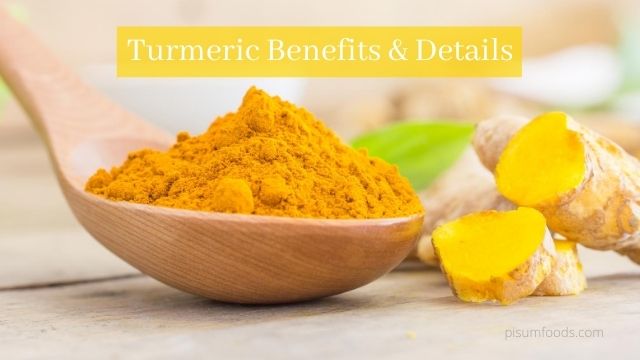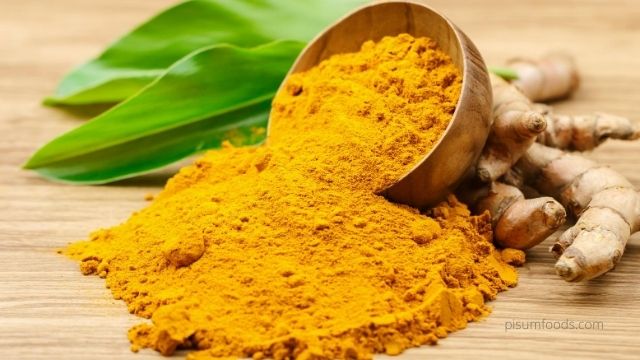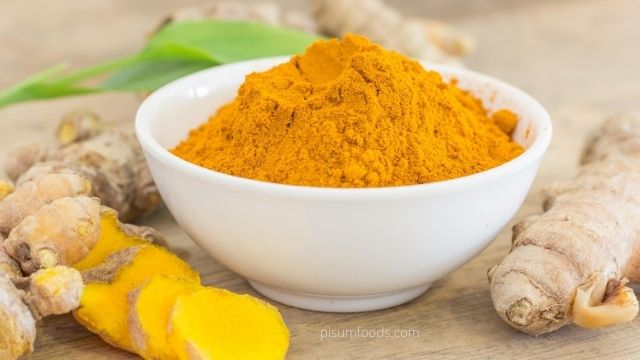 Translate
Translate Translate
TranslateTurmeric is a member of the Curcuma botanical group. This is basically a part of the ginger family of herbs, the Zingiberaceae. The botanical name of Turmeric is Curcuma longa. Turmeric is widely grown both as a kitchen spice and also for its various medicinal uses. Powdered turmeric root is the best known form of Turmeric. It is a popular spice, frequently used in Eastern cooking. It is an important ingredient of curry powders, and is also used to give mustard its characteristic color. In this blog we will talk about the benefits of turmeric, side effects and precautions.

Turmeric may be said to be the most effective nutritional supplement in existence. Many studies show that it has major benefits for your body and brain. The various turmeric properties are because of which the spice has so many health benefits. It is naturally anti-inflammatory, and loaded with nutrients and minerals. Turmeric is also used for hay fever, depression, high cholesterol, a type of liver disease, itching so on and so forth. Some people use turmeric for heartburn, thinking and memory skills, inflammatory bowel disease, stress, and many such other conditions. But more research in this field is required.
Turmeric for health is very useful. As mentioned above, turmeric has various characteristics which make it ideal for consumption. The major health benefits of turmeric are as follows:
Turmeric is a very important spice in India. It is being used in India for thousands of years as a spice and also as a medicinal herb. Research proves that Turmeric does have various medicinal properties due to the composition of compounds present in it. These compounds are called curcuminoids and the most important of which is curcumin. Curcumin, the main active ingredient in turmeric, has powerful anti-inflammatory effects and is a very strong antioxidant. Curcumin is fat soluble, so it may be a good idea to take it even with a fatty meal. Curcumin is a substance with powerful anti-inflammatory and antioxidant properties. Most research studies used turmeric extracts that are standardized to include large amounts of curcumin.
Turmeric is said to be a natural anti-inflammatory compound. Inflammation is incredibly important. It helps our body to fight foreign invaders and also has a role in repairing damage. Without inflammation, pathogens like bacteria could easily take over your body and lead to death. Although acute, short-term inflammation is said to be beneficial for your body. But inflammation can become a major problem when it becomes chronic and inappropriately attacks your body’s own tissues.
Thus, anything that can help fight chronic inflammation is of importance in preventing and even treating various diseases. Curcumin in Turmeric is strongly anti-inflammatory. In fact, it’s so powerful that it matches the effectiveness of some anti-inflammatory drugs, without the side effects. Chronic inflammation contributes to many common Western diseases. Curcumin can suppress the molecules known to play major roles in inflammation.
Consuming Turmeric increases the antioxidant capacity of the body. Oxidative damage is believed to be one of the mechanisms connected to aging and many diseases. It also involves free radicals, highly reactive molecules with unpaired electrons. The free radicals tend to react with important organic substances, like fatty acids, proteins or DNA. The main reason why antioxidants are so beneficial for your body is because they protect your body from free radicals.
Curcumin in Turmeric is a potent antioxidant that can neutralize free radicals due to its chemical structure. Curcumin also boosts the activity of your body’s own antioxidant enzymes. Thus, Cucurmin blocks them directly, and then also stimulates your body’s own antioxidant defenses. Thus Turmeric helps to increase the antioxidant capacity of your body.
Neurons in the brain are capable of forming new connections. But in certain areas of the brain they can also multiply and increase in number. One of the main drivers of this process is brain-derived neurotrophic factor (BDNF). This is a type of growth hormone that functions in your brain. Many brain disorders have been linked to decreased levels of this hormone, such as depression and Alzheimer’s disease. Curcumin in turmeric can also increase brain levels of BDNF.
Thus this may be effective in delaying or even reversing many brain diseases and age-related decreases in brain function. It is also said that this may also improve memory and make you smarter, due to the effects on BDNF levels. However, research in this field is still ongoing. Thus, Turmeric is also Linked to Improved Brain function.

Heart disease is the number 1 cause of death in the world. Thus, a lot of research has been conducted in this area. It is said Curcumin may help reverse many steps in the heart disease process. The main benefit of curcumin when it comes to lower risk of heart disease is improving the function of the endothelium. Endothelium is the lining of your blood vessels. The endothelial dysfunction is a major driver of heart disease and involves an inability of your endothelium to regulate blood pressure, blood clotting and various other factors.
Many research studies suggest that curcumin leads to improvements in endothelial function. Curcumin also reduces inflammation and oxidation, which also plays an important role in heart disease. Therefore, consuming Turmeric may also lower the risk of heart disease.
Cancer is a very dangerous disease. It is characterized by uncontrolled cell growth. There are many different types of cancer but have several things in common. Some of these types may be affected by curcumin supplements. Curcumin has been researched as a beneficial herb in cancer treatment and has been found to affect cancer growth, development and spread at the molecular level. Some research studies have also shown that it can contribute to the death of cancerous cells and reduce angiogenesis that is the growth of new blood vessels in tumors and metastasis that is the spread of cancer.
Some studies also reveal that curcumin can reduce the growth of cancerous cells in the laboratory and inhibit the growth of tumors in test animals. Curcumin is said to lead to several changes on the molecular level that may help prevent and perhaps even treat cancer. But more research in this field is required to come to a concrete conclusion.
Alzheimer’s disease is the most common neurodegenerative disease in the world and a leading cause of dementia. Unfortunately, no treatment is available for this disease yet. Thus, preventing this disease from occurring is very important. Curcumin has been shown to cross the blood-brain barrier. It is known that inflammation and oxidative damage play a major role in Alzheimer’s disease, and curcumin, fortunately has beneficial effects on both. Whether curcumin can really slow down or even reverse the progression of Alzheimer’s disease in humans is still unknown and needs more research. But we can say that Curcumin has been shown to lead to various improvements in the pathological process of Alzheimer’s disease.
Arthritis is a common problem today. There are several different types in this disease but most of it involves inflammation in the joints. As we saw above, Curcumin is a potent anti-inflammatory compound, and may thus help with arthritis. Many studies have stated this to be true. Some studies also show that curcumin can help treat symptoms of arthritis and is in some cases more effective than anti-inflammatory drugs. But more concrete research in this area of study is necessary in order to get a proper conclusion.
Curcumin has also shown incredible benefits against treating depression. According to certain studies, curcumin is as effective as an antidepressant. Depression is usually linked to reduced levels of brain-derived neurotrophic factor (BDNF) and a shrinking hippocampus (a brain area with a role in learning and memory). Curcumin is known to boost BDNF levels, potentially reversing some of these changes. There is also some evidence in research studies that curcumin can boost the brain neurotransmitters serotonin and dopamine. Therefore, Turmeric may also be helpful against depression.
Every food product also has various side effects. Consuming Turmeric or even applying it has various side effects. Therefore, before using Turmeric reading these side effects and understanding them thoroughly is important in order to prevent yourself from any issues. Here are some major side effects of Turmeric:
Turmeric is said to be likely safe when taken by mouth for short-term. Turmeric products that provide up to 8 grams of curcumin daily are safe when used for up to about 2 months, and up to 3 grams of turmeric seems to be safe when used for up to about 3 months. Turmeric generally doesn’t cause any serious side effects. But some people do experience mild side effects such as stomach upset, nausea, dizziness, or diarrhea. These side effects are more common when turmeric is consumed in higher doses.
Turmeric is likely to be safe when applied to the skin. It is said to be possibility safe when applied to the skin inside the mouth as a mouthwash.
Turmeric is known to be possibly safe when it is used as an enema. More research in this field needs to be conducted.

The export of turmeric from India has been increasing over the years. Turmeric ranks third in the total exports of spices from India. India’s turmeric export has now almost touched $236 million in the year 2018. North America is the largest market for the exported Turmeric from India. Pisum Foods is one of the leading turmeric exporters from India. We hold immense experience of the Food export industry and understand the industry and its workings inside out. We help our clients right from finding buyers, documentation until the final order is delivered. We are a legally certified food export company in India and abide by all the health and safety standards. Our executives are trained to help you with any issues which may occur during the export process.
Even though Turmeric is a very useful spice, too much of it is not good. Turmeric is also not good to consume in large amounts especially if you are pregnant, have gallbladder problems, bleeding problems so on and so forth. Here are some precautions you should take while consuming Turmeric:
During pregnancy and while breast-feeding, turmeric is known to be likely safe when taken by mouth in amounts commonly found in food. But, turmeric is likely unsafe when taken by mouth in medicinal amounts during pregnancy. It is unsafe because it may promote a menstrual period or stimulate the uterus, putting the pregnancy at risk. Therefore experts Do not recommend to take in medicinal amounts of turmeric if you are pregnant. As of now, there is not enough information to rate the safety of medicinal amounts of turmeric during breast-feeding. But it is best not to use it.
Turmeric is also said to make gallbladder problems worse. Therefore, experts recommend not to use Turmeric if you have gallstones or any other issues with respect to the gallbladder. So remember, Do not use turmeric if you have gallstones, a bile duct obstruction so on and so forth.
Taking turmeric is said to slow the blood clotting process. This might increase the risk of bruising and bleeding in people especially with bleeding disorders.
Curcumin, a major chemical in turmeric, might decrease blood sugar in people with diabetes. Therefore, turmeric should be used with caution in people with diabetes as it might make blood sugar too low.
As I said before, turmeric might slow blood clotting. Therefore, it may also cause extra bleeding during and after surgery. Experts recommend to stop using turmeric at least 2 weeks before a scheduled surgery.
Pisum is the leading turmeric exporter from India. We at Pisum believe that Indian culture, food, flowers, and such other products should be spread to the entire world. Our executives at Pisum spices export company are trained to help and support our clients at each step of the export process. With our expertise and extensive experience in the export field, we make sure that the import of turmeric is a hassle-free process for our clients. If you are interested in importing turmeric from India, Contact Pisum now for more information!